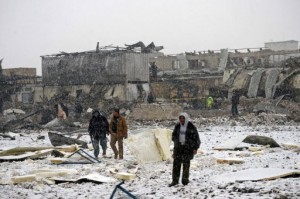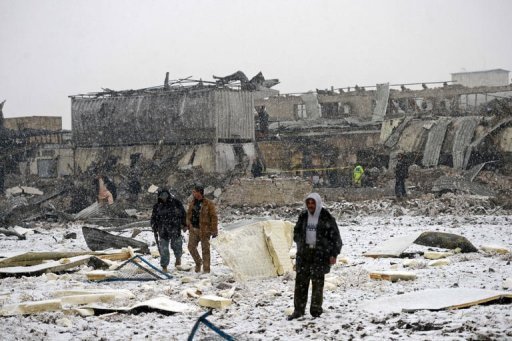
Kabul (AFP) – A Taliban car bomb targeted a US company in Kabul on Monday, killing one person and wounding at least 15 shortly after a landmine killed 10 young girls in eastern Afghanistan, officials said.
It was the most brazen assault aimed at westerners in the fortified Afghan capital since a suicide car bomber killed 12 people, including eight South Africans, on 18 September.
A security source at the military contracting firm Contrack told AFP that five foreigners, including Americans and South Africans, were among the wounded. Police said only three foreigners were slightly injured, mainly by flying glass.
Contrack is a US-owned company which builds military facilities for the Afghan army and police, an employee said.
“We were sitting in the office. There was a massive explosion. The ceiling collapsed over us and 10 to 12 Afghans in the office were wounded,” he said.
Police said it was not immediately clear whether anyone had been in the truck when the huge explosion occurred.
“A small truck packed with explosives detonated between Contrack and Najeeb Zarab factories; one person is dead and 15 others are wounded,” Kabul police chief Mohammad Ayoub Salangi told AFP.
“We don’t yet know whether there was someone in the truck or it was detonated remotely. They were very powerful explosives.”
The Taliban claimed responsibility for the attack, saying it was a suicide car bombing carried out by a “hero mujahid” on “an important American company which provided security services to the invading forces.”
“This company was under the surveillance of the mujahedin for a while and thanks God today the opportunity was provided to attack it,” Taliban spokesperson Zabihullah Mujahid said in a statement.
The militia, which was ousted from power in Kabul by a 2001 US-led invasion, is fighting to bring down the western-backed government and to expel US-led foreign troops.
An AFP reporter at the scene said there were signs of a huge explosion beyond an area blocked off by police, and some bystanders had also suffered minor injuries.
In May, Taliban bombers disguised in burqas attacked a heavily fortified guest house used by westerners in the same area. Seven people were killed at the Green Village complex used by the European Union, the United Nations and aid groups.
A US-led NATO force of some 100,000 troops is backing the Kabul government against the Taliban insurgents, but they are due to pull out in 2014 and are training the Afghan army and police to take over responsibility for security.
In eastern Afghanistan, 10 girls aged nine to 11 died when one of them accidentally struck a mine with an axe as they were collecting firewood before going to school in an area troubled by Taliban violence.
“An old mine left over from the time of the jihad [against Soviet troops in the 1980s] exploded, killing 10 girls and wounding two others,” Chaparhar district governor Mohammad Sediq Dawlatzai told AFP.
Nangarhar provincial government spokesman Ahmad Zia Abdulzai said the mine was planted by “the enemies of Afghanistan” – a reference to the Taliban – even if it had been dormant for some time.
President Hamid Karzai appeared to accept this explanation, condemning the blast as “an unforgivable crime” in a statement.
The commander of NATO and US forces in Afghanistan said he was deeply saddened.
“Over three decades of conflict, Afghanistan became one of the most heavily mined countries on earth,” said General John Allen.
“These precious children were innocent victims and I express my sincere sympathy and condolences to the families and friends of those affected.”
Most of the bodies were so badly shattered that they could hardly be recognised, Dawlatzai said.
Despite international clearance efforts, more than three decades of war have left Afghanistan one of the most heavily-mined countries in the world.
The explosives were placed during three recent conflicts: the 1980s war against the Soviets, the 1990s civil war, and during fighting between the Northern Alliance and the Taliban before they were ousted in 2001.
The Taliban now plant bombs, or improvised explosive devices, to target Afghan troops and their NATO backers but these regularly kill civilians.

